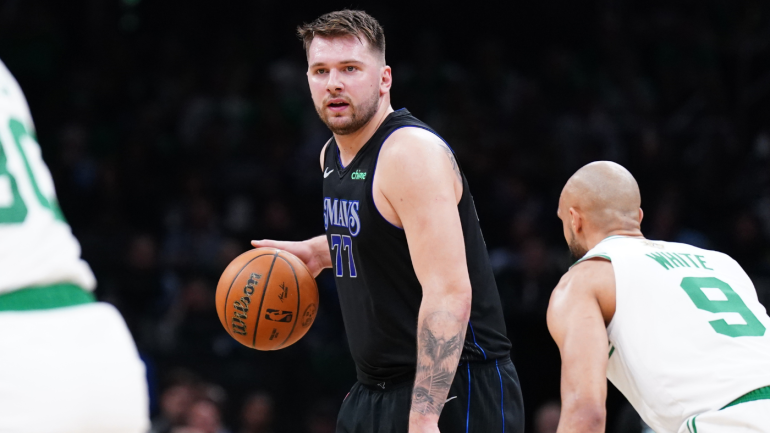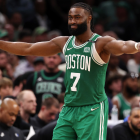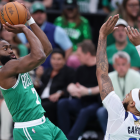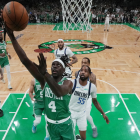
There are plenty of numbers to note coming out of the Boston Celtics' 107-89 thrashing of the Mavericks in Game 1 of the NBA Finals: Boston's 27-point advantage from 3. Kyrie Irving's 12 points (not nearly enough). Kristaps Porzingis' 20 points and three blocks in his first game following a 38-day absence. Jaylen Brown's 22 points on 12 shots to go with six stocks (three steals and three blocks).
But the number that stands out the most is one.
As in, the number of Luka Doncic assists.
Doncic has played 446 games, including the playoffs, in his career. Only six times has he been held to fewer than two assists. It had never happened in the playoffs until Thursday night, when the Celtics decided they had the horses to play him straight up rather than having to commit to double teams, which in turn allowed their peripheral defenders to stay home on shooters and lob rollers.
"What makes our team really special is we don't have guys we hide on defense," Jayson Tatum said. "...We're not showing [with a second defender] or anything like that because that can compromise your defense."
Forcing defenses into this very compromise is Doncic's super power. He typically leverages his scoring prowess into open 3-point shots and easy rim finishes in his sleep. He's going to get his 30 points just about every night, and indeed he did so in Game 1, but when he creates another 25-30 points via 10-12 assists, that's when it gets overwhelming.
It was apparent on Doncic's first bucket of the game that Boston was going to trust its primary defender rather than giving him passing lanes when Brown found himself isolated on Doncic as he backed into the paint. Typically, a second defender would've dropped down to help, leaving a shooter open for an easy kick-out 3. But watch how Holiday stays connected to Kyrie Irving and White does the same with P.J. Washington, and the Celtics happily live with Doncic having to convert a tough mid-range jumper.
This is the tradeoff. Doncic can make all the contested two-point shots he wants, but the Celtics almost never lose when they're on the plus side of the 3-point ledger. If they don't let the Dallas support staff get going from beyond the arc, Doncic is going to have a hell of a time making enough shots like this to keep up, especially when Irving isn't pulling his weight.
Here you see it again, with Doncic getting downhill against Tatum in the second quarter. Holiday stunts down but only as a show as he immediately reverts back out to Irving, and more important, Horford is committed to Washington in the corner. Doncic, with nobody open, is forced to take a contested layup, which he fails to make.
It's a cardinal sin to help off a strong-side corner shooter, but guys do it all the time. It's human nature to react, or overreact, to a superstar scorer making his way toward the rim, but Horford was consistent with his execution. Late in the second quarter he again resisted the urge to come to the aid of Tatum, who was clearly beaten by Doncic, because he knew it was more important to stay connected to Maxi Kleber in the corner.
On the first possession of the third quarter, Horford made the right call again, literally face-guarding Irving in the corner with his back to Doncic as he drove in for another layup.
Again, conceding these kinds of two-pointers only decide the battle of one possession. It's the 3s that will decide the war of this series, and Boston knew that Dallas had made more corner 3s (4.6 per game in the playoffs) than any other team entering the Finals. The Mavs made one on Thursday. And it wasn't like they were just missing. They were only able to generate three corner attempts -- almost nine fewer than their playoff average -- because of the Celtics' outright unwillingness to vacate shooters.
At one point Doncic found himself so open in the paint he didn't know what to do. When he spun away from Brown he was expecting there to be a crowd around him, but every Boston defender stayed connected to their shooter. By the time he reassessed his position and passed out to the corner shooter, White was out there in a blink.
OK, so covering the 3-point kickouts was the first part of cutting off the passing impact of Doncic, who entered the game leading the playoffs with 3.69 assisted 3s per 100 possessions, per PBT Stats -- which also confirms Doncic as the No. 1 at-rim assister by a mile with 81 so far in these playoffs. Stopping that was the second part.
The vast majority of these at-rim assists come on lob passes to the likes of Daniel Gafford and Dereck Lively II when low defenders come up too far to stop Doncic's drives and leave the big man open behind them. Late in the season, Gafford made 33 consecutive shots, just two off Wilt Chamberlain's all-time record, by feasting on these easy lob finishes largely created by the disproportionate attention paid to Doncic.
Here's Brown, who was absolutely brilliant defensively, talking in his postgame presser about the emphasis Boston put on stopping these lob passes and the integral part he played in carrying out the mission.
Jaylen Brown says their emphasis tonight was to shut off the lob game for Dallas, and he liked how they executed defensively pic.twitter.com/4K1A46ATTm
— Shane Young (@YoungNBA) June 7, 2024
The first thing Boston did to combat these lobs (and give Joe Mazzulla credit for having this foresight) was to put Tatum on whichever Dallas center was in the game in anticipation of Gafford/Lively being Doncic's primary ball screener. Tatum, in this case, is a ready-made switcher onto Doncic, but this deployment only works if the guy switching off Luka and onto the big man can do his part. Suffice it to say, Brown did his part.
On this play, Brown was Luka's initial defender. As Boston anticipated, Lively screened and Brown went with him as Tatum switched onto Luka, who eventually does a good job of splitting two defenders to get into the paint. As Doncic approaches the rim, look at Brown boxing out Lively to thwart any possibility of a lob pass, forcing Doncic to make a absurdly difficult shot that he will not be able to consistently replicate as this series progresses.
Late in the third quarter, Brown authored the defensive sequence of the game. It was one of the few times the Celtics tracked Doncic with two defenders, leaving the high-flying Derrick Jones Jr. to roll freely to the rim for what looked like a highlight waiting to happen. Brown had other thoughts, rushing over to break up the lob before stoning Jones again on a second attempt.
JAYLEN BROWN IS ALL DEFENSE pic.twitter.com/oLXyGdo2tV
— Lorenzo (@wegoticezo) June 7, 2024
That lob to Jones? Doncic can usually count on three or four of those every game, and at least three or four more on kickouts for 3s. He came into Game 1 averaging a playoff-leading 8.8 assists per game. That he was only able to post one assist Thursday is almost unfathomable.
It was, to be fair, a little bit fluky, as the Mavericks did miss some shots created by Luka that they often make. But let's give credit where it's due. Boston's plan was smart, its execution flawless. Now let's see whether the Celtics can do it again in Game 2.






















